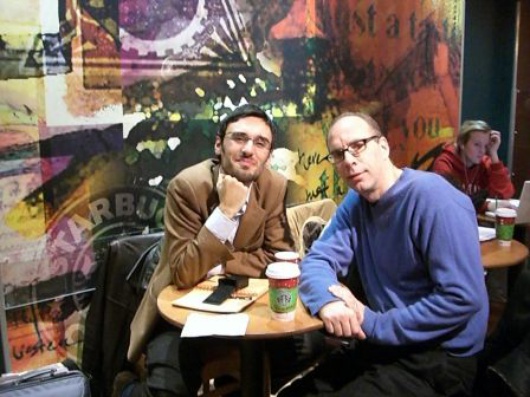Crowd-sourcing journalism for cafebabel.com?
Published on
How to valorise the force of Babelians' network in order to do good journalism? How to combine the information spread among millions of eurogenerations sons with the editorial goals of a journalist? In our case, both - the crowd and the journalist - are Babelians. But matching their knowledge is often difficult. What if I have to write a panorama article on smoking bans all around Europe?
Where can I kfind the information?
 Jay Rosen is a Journalism professor in the New York University I met during my trip to the US (see my blog). In the pre-web area he was part of the civic journalism movement warning medias they were disconnecting from the public.
Jay Rosen is a Journalism professor in the New York University I met during my trip to the US (see my blog). In the pre-web area he was part of the civic journalism movement warning medias they were disconnecting from the public.
"Then in 2002 a student told me about blogging and I started PressThink. In summer 2006 I founded the project NewAssignment.net because I thought the opensource method (optimising the labor division among tons of developers contributing to a common project) could well be applied to journalism". This was the birth of crowd-sourcing journalism".
The true test for Newassignment will be Beatblogging, a project gathering 12 professional journalists each of whom working on a specific beat in cooperation "with a crowd of citizens". This means to get sources, facts or figures from the crowd, from citizens.
A. How to do crowd-sourcing journalism
- technics aren't important. "You do it in the comments of a blog, by starting a facebook group, via a web-form. Maybe we will create a FB application for that but only once we will have experienced this project".
- find a good, interesting story (incentive)
- give clear instructions to the public: ask them for hard facts + opinions (optional)
- give recognition (byline, photo of the contributor...)
- give a feedback: "we received it, thank you"
- the contributor has to be told how his contribution will fit in the whole story
B. Examples of crowd-journalism
- WNYC radio ran an investigation asking their listeners to fill a webform with the price of milk in they NY area. It was a mid-morning show with a well-educated audience and a very loyal one.
- "We asked people to send photos of their polling place during the 2006 elections. In the US you have crazy places for voting".
- Talkingpointsmemo (a very popular blog in the US) did it in its spinoff website on political investigation (Muckraker). There was a scandal when 8 state attorneys general were fired from Alberto Gonzales at the same time. They were Republicans. This very influential blog started a campaign to know the truth and forced the Congress to open an investigation which let 3000 pages of records to be released. Talkingpointsmemo asked its audience to scan those pages and the work was done in one day. "But you have to have a very loyal audience: the blog had covered this story for months. Moreover you need an audience with the skills to do what you ask them to do. You in cafebabel.com can do that with EU documents e.g."
"You know technology really doesn't matter. But I am sure 95% of the methods are still unknown".
C. about Cafebabel.com
"Did you read Habermas?", asked Rosen. "He speaks about that European bourgeoisie who invented the public opinion in XVIII century. You in cafebabel.com reminds me that".
What do you think of crowd-journalism? Do you think it can be a good thing for cafebabel.com? Express yourself in the comments!
P.S. This version includes links and mispelling correction to WNYC name.



